| Srl | Item |
| 1 |
ID:
104713
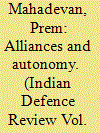

|
|
|
| 2 |
ID:
116164
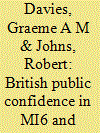

|
|
|
|
|
| Publication |
2012.
|
| Summary/Abstract |
There are considerable concerns about public perceptions of intelligence stemming directly from the highly politicized nature of intelligence estimates in the run-up to the US-UK invasion of Iraq in 2003. In this article we use a new public attitudes dataset to provide the first ever analysis of British public confidence in MI6 and Government use of intelligence. The article demonstrates that the public have relatively high confidence in the intelligence produced by MI6 but are extremely sceptical about how the Government will present that intelligence. Using an ordered logit model this article then examines the factors that influence public perceptions of both intelligence and Government, finding that women are a lot less confident in both the intelligence services and government presentation of intelligence than men, suggesting that this might help explain gender differences in support for military action. The study also demonstrates that party identifiers and Catholics have very low confidence in the intelligence produced by MI6. The study shows that public confidence in both government and intelligence has a strong effect on support for preventive military action against terror camps, suggesting that the intelligence agencies need to avoid being contaminated by political agendas as much as possible if the intelligence case for future military actions is to be supported by the public.
|
|
|
|
|
|
|
|
|
|
|
|
|
|
|
|
| 3 |
ID:
149647
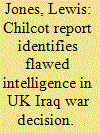

|
|
|
| 4 |
ID:
111895
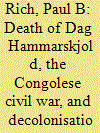

|
|
|
| 5 |
ID:
115023
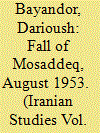

|
|
|
|
|
| Publication |
2012.
|
| Summary/Abstract |
Over the decades that followed the overthrow of Mosaddeq in August 1953 a narrative attributing the fall exclusively to foreign conspiracy has taken hold and become institutionalized. In this narrative the internal factors are reduced to the simplest level of abstraction. They do not exist outside foreign conspiracy! This narrative is premised on an Anglo-American coup plot code-named TP-AJAX that was attempted in the late hours of 15 August but failed. The ensuing flight of the Shah generated dynamics which led to the fall of Mosaddeq four days later. The CIA chief operative in Tehran Kermit Roosevelt was quick to take credit claiming that these dynamics were inseminated by his ingenious and spontaneous planning. For abiding internal reasons both the CIA and the MI6 headquarters preferred to claim victory rather than admit failure. Evidence that emerged following the declassification of the State Department papers in 1989 and the leak of a secret CIA internal history in 2000 produced glaring evidence that the fall of Mosaddeq on 19 August 1953 had taken Washington, even its embassy in Tehran, by complete surprise and that post facto claims by Roosevelt were inconsistent both with Washington's explicit policy directives and Roosevelt's own situation reports filed with the CIA Washington during the interval between the two events. Roosevelt later published a phantasmagorical account of the event which, together with reminiscences of a few unnamed former operatives, was given credence by Professor Gasiorowski and associates, who curiously chose to ignore archival evidence.
|
|
|
|
|
|
|
|
|
|
|
|
|
|
|
|
| 6 |
ID:
185813
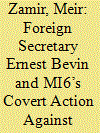

|
|
|
|
|
| Summary/Abstract |
The principle of civilian control over the military and the secret services is essential for healthy democracies. That principle was challenged under the Labour government in Britain from 1945-1951, when the military and MI6 in the Middle East conducted their own parallel ‘defence policy’ using deception and misinformation, not only against their country’s enemies, but against their own elected government. The outcome was a divided and confused foreign policy in a region that was considered vital to Britain’s strategic interests. This research, which is based on sources from French, British, American and Israeli archives, as well as Syrian and other Arab documents, sheds light on the covert action of MI6 officers operating from their headquarters in Cairo with the backing of high-ranking officers in the Middle East Command, to subvert France's colonial rule in North Africa. Their clandestine activities contradicted the policy of Foreign Secretary Ernest Bevin, who sought to amend his country’s relations with France after their clash in Syria in the summer of 1945, and integrate it in an anti-Soviet European alliance. The MI6 Arabists' covert action in French North Africa serves as a case study to re-evaluate Bevin’s control of the organization, which was ostensibly accountable to him. The article questions Bevin’s reputation as a powerful Foreign Secretary who dominated the Foreign Office, and raises doubts about his ability to oversee MI6’s clandestine operations in the Middle East.
|
|
|
|
|
|
|
|
|
|
|
|
|
|
|
|
| 7 |
ID:
114163
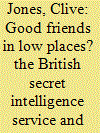

|
|
|
|
|
| Publication |
2012.
|
| Summary/Abstract |
This article explores intelligence collaboration between British Intelligence and the Jewish Agency during the Second World War. Most accounts of this period highlight the functional nature of this collaboration, accounts that inevitably have come to be viewed through the prism of the Holocaust, and with it the prevailing sense that Britain offered 'too little too late to help' in using its clandestine assets to help rescue the remnants of European Jewry. By focusing however on collaboration primarily between the British Secret Intelligence Service (MI6) and the Jewish Agency, this article argues that intelligence liaison and collaboration at an operational level was closer and less conditioned by adherence to stated British government policy than hitherto suggested.
|
|
|
|
|
|
|
|
|
|
|
|
|
|
|
|
| 8 |
ID:
104253
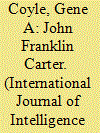

|
|
|
| 9 |
ID:
091990
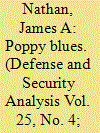

|
|
|
|
|
| Publication |
2009.
|
| Summary/Abstract |
In 2002, facing a fast-rising tide of Afghan opium, the Bush Administration's response seemed puzzling. Apparently, the CIA was well aware their Northern Alliance partners had financed themselves by selling opium and herion. The labs and store houses of Afghanistan would have been sensible bombing targets if Afghanistan were to be made anew.
|
|
|
|
|
|
|
|
|
|
|
|
|
|
|
|
| 10 |
ID:
114208
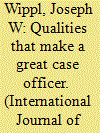

|
|
|
| 11 |
ID:
038761
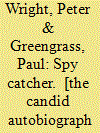

|
|
|
|
|
| Publication |
New York, Viking, 1987.
|
| Description |
392p.Hbk
|
| Standard Number |
0670820555
|
|
|
|
|
|
|
|
|
|
|
|
Copies: C:1/I:0,R:0,Q:0
Circulation
| Accession# | Call# | Current Location | Status | Policy | Location |
| 028992 | 920.932712/WRI 028992 | Main | On Shelf | General | |
|
|
|
|
| 12 |
ID:
171242
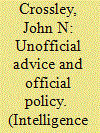

|
|
|
|
|
| Summary/Abstract |
Sir Maurice Oldfield became a Visiting Fellow at All Souls College, Oxford, when he retired from being head of MI6. No details have previously been given but recently his report to the college has been unearthed. It provides valuable insights but shows he was not a professional historian. He was looking at the interaction between unofficial advice and official policy, and picked on three key figures from before the Second World War. Comprehensive accounts of their exploits have only recently been published, significantly using material not available in 1978‒9. His choice is impressive; his judgment was astute.
|
|
|
|
|
|
|
|
|
|
|
|
|
|
|
|
| 13 |
ID:
160601
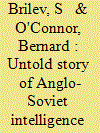

|
|
|
|
|
| Summary/Abstract |
A CURIOUS DOG first leapt out of the bushes. It sniffed everything around it. Then it ran on. There was its mistress. The high boots that in England are called Wellingtons. Khaki jodhpurs. A green oilcloth jacket with a brown velvet collar. And the woman herself was a blonde with a distinctive (if not characteristic) bump in her nose, clearly passed down from her Norman ancestors.
|
|
|
|
|
|
|
|
|
|
|
|
|
|
|
|
| 14 |
ID:
179859
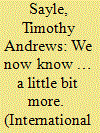

|
|
|
|
|
| Summary/Abstract |
Igor Gouzenko’s defection might have been the first—and most famous—of the Cold War in Canada, but it was hardly the last. Recently opened after Access to Information Act requests made by the Canadian Foreign Intelligence History Project, a number of records cast brighter light on this aspect of Canada’s intelligence history. This article offers an overview of how the Government of Canada established its policy to manage defection and those who defected. It offers a number of possible leads for future research projects, some, but not all, of which, will require the release of further material, whether under the Access to Information Act or a broader declassification framework from the Government of Canada.
|
|
|
|
|
|
|
|
|
|
|
|
|
|
|
|
| 15 |
ID:
140612
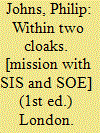

|
|
|
|
|
| Edition |
1st ed.
|
| Publication |
London, William Kimber and Co. Limited, 1979.
|
| Description |
216p.: ill.hbk
|
| Standard Number |
0718300270
|
|
|
|
|
|
|
|
|
|
|
|
Copies: C:1/I:0,R:0,Q:0
Circulation
| Accession# | Call# | Current Location | Status | Policy | Location |
| 018736 | 940.5485/JOH 018736 | Main | On Shelf | General | |
|
|
|
|